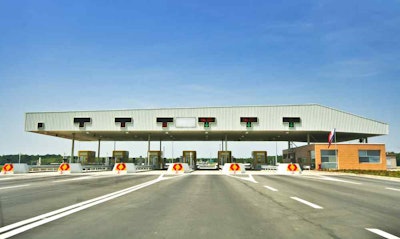
Island lawmakers ended session June 25 without approving Gov. Gina Raimondo’s plan to repair infrastructure with truck-only user fees on about two dozen bridges. A month before, the Democrat governor introduced RhodeWorks, a 10-year,, $1.1 billion improvement plan. It was to be included in the upcoming state budget and proposed tolling Class 6 trucks and higher before it was amended to affect only Class 8 trucks, once per location per day.
The House passed a budget without RhodeWorks, while the Senate overwhelmingly approved a truck toll bill that dropped fees from $6 to 3.50. Legislators are expected to revisit the issue when their new session starts in January.
The Rhode Island Trucking Association said the Senate’s plan, which added rebates and tax credits for state businesses, could violate interstate commerce laws. The association has criticized the Raimondo administration for not disclosing the proposed tolling locations so local business owners can gauge potential impact.
RITA’s plan excludes tolling, but does increase costs for truckers. It would create more than $220 million over four years, which is the amount RhodeWorks allocates to repair 453 bridges outside of the 6/10 connector.
After the fourth year, RITA’s plan will produce annual revenue of $25.9 million. The state transportation department could bond this revenue for the 6/10 connector or the entire package could be bonded to include all RhodeWorks projects listed.
The association’s proposal could be implemented immediately, while Raimondo’s plan would require waiting until 2018 to spend $43 million on tolling gantries. It also would:
- Increase diesel tax from 24 to 52 cents per gallon to produce $10.8 million annually. Connecticut’s gas tax is 55 cents.
- Increase the truck registration fee by $500 per year, which will yield $1.6 million annually.
- Ask the state to rescind currently proposed tax credits, which would revert funds back for bridge and road maintenance, resulting in $13.5 million more annually
The RITA plan and RhodeWorks both call for refinancing garvee bonds, which the association says will produce $121 million in first four years. The National Highway System Designation Act of 1995 authorized these bonds to allow state and local agencies to issue debt for transportation projects, using future federal highway funds to repay the principal, interest, and costs associated with the issuance of the debt.
Association President Christopher Maxwell says some traffic assumptions in RhodeWorks proposal are inaccurate, which could significantly affect projected revenue. “The governor has already admitted that if revenue projections do not pan out her only recourse would be to increase the tolls on the trucking industry,” Maxell said.
The association contacted the American Transportation Research Institute, which conducts transportation research, to examine some of its concerns over RhodeWorks. ATRI used GPS to evaluate trucking patterns, while RhodeWorks used a different method.
Still, ATRI found for every 100 trucks traveling I-95 from the Connecticut border to I-295, there are 50 trucks traveling on I-195. RhodeWorks data shows that for every 25 trucks driving that same route on I-95, there are 100 trucks traveling I-195. “If the RhodeWorks data proves to be false with regard to I-195, the administrations revenue projects may be off by as much as $30 million dollars,” Maxwell said.








